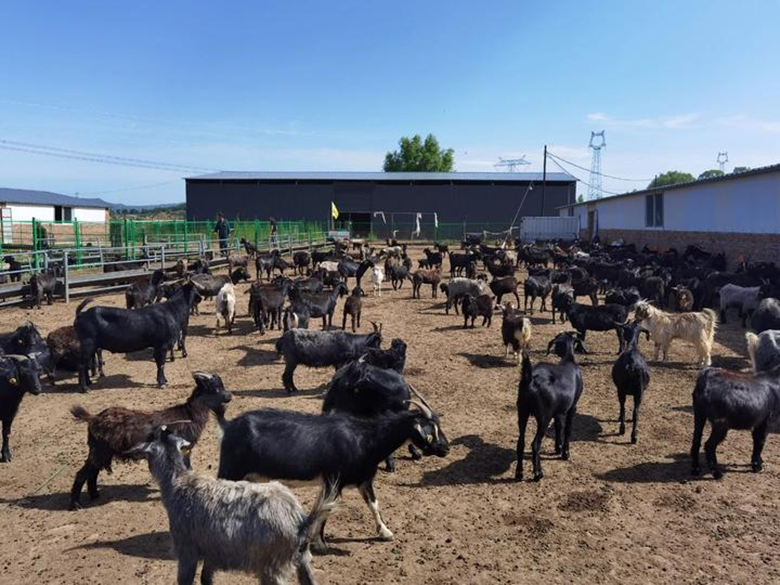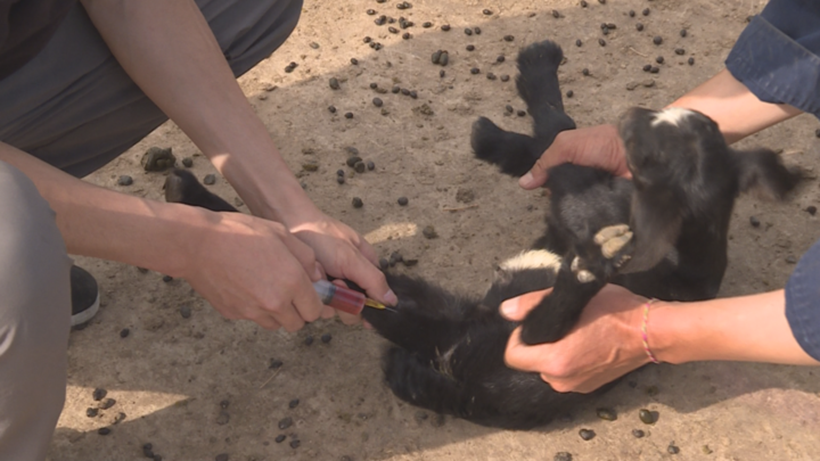I. Project Overview
Featuring a plethora of mountainous terrain and lacking significant amounts of flat land, Zuoquan County, Jinzhong City, Shanxi Province, is home to a long-standing tradition of goat farming on its ridges. The Zuoquan government eventually designated goat husbandry a key agricultural industry and implemented a comprehensive plan designed to support its development. International media organisation China International Communications Group (CICG) has been assisting a village of 388 people, a quarter of whom are over 60 years old, living in 147 households located in northern Zuoquan's Hanwang Township that is especially suited to goat farming known as Lichang in recent years as part of these efforts. The CICG working team that has been involved introduced a special breed of goat that was dubbed the black goat and has helped the village develop its goat farming industry in order to promote rural vitalisation based on the findings of thorough research that was conducted with local animal husbandry experts on the natural and economic conditions in the area.
II. Interventions
CICG's working team helped Lichang pursue black goat farming and develop its goat industry in line with Zuoquan's county-level industrial planning. The Zuoquan government issued a document known as the Three-Year Action Plan (2022-2024) for Promoting Industrial Development and Rural Vitalisation in order to fuel the development of the local goat industry, which resulted in the establishment of a goat industrial chain running through a swath of the mountain range running down the eastern edge of the Loess Plateau known as the Taihang Mountains overseen by a body consisting of heads of townships and relevant county departments led by the deputy head of Zuoquan tasked with organising, coordinating, and guiding the development of the industry and the building of the Zuoquan Goat brand.
A new breed that is more efficient than the local breed, the black goat that was introduced in Lichang was developed by crossbreeding the local breed with the black Nubian goat, which is a distinctive breed with long ears, large eyes, a wide forehead, long legs, and a short coat that is originally from Great Britain and usually used for its milk and meat. The undertaking aligned with Zuoquan's county-level industrial planning and gained financial and intellectual support from the local agricultural administration.
CICG's working team formulated a meticulous assistance plan after conducting in-depth research on the nature and development level of the animal husbandry industry in Zuoquan as well as neighbouring counties such as Heshun, Kelan and Wenshui. The team thought it would be best to pursue black goat farming and strive to achieve an economy of scale by implementing a development model involving "enterprises + village collectives + farmers" that enables collectives' shareholders to receive dividends after communicating with Lichang's officials and its residents' committee. CICG's working team helped the village obtain a grant from an organisation known as the Jinzhong Poverty Alleviation Foundation that was used to purchase 200 female black goats during the first phase of the project, and CICG directly invested in the expansion of sheep housing in the village after an evaluation of the first phase of the project proved to be favourable in 2023.

A glimpse of the black goat farming base in Lichang Village, Hanwang Township, Zuoquan County, Jinzhong City, Shanxi Province
Actively incorporating both industry and academia into the project, CICG's working team utilised intellectual support provided by Shanxi Agricultural University (SXAU). An SXAU research team developed the black goat breed with the unique climate present in the Taihang Mountains area and successfully implemented the project in Heshun. Field investigations conducted by the team confirmed that the climate, geography, and vegetation coverage in Lichang did indeed make the village suited to black goat farming, and CICG's working team soon launched the village's black goat husbandry project with the SXAU research team, which has led to the attainment of significant results.
An IT company that CICG's working team invited to participate in the project also built a black goat biological asset supervision and traceability application system, and it was deployed in Lichang. Internet of Things technology has made it possible to gather data and information covering the entire farming process, including breeding, quarantining, transportation, trading, slaughtering, processing, sales, and distribution, which has accelerated the digitalisation of the village's goat husbandry industry and furnishes data for agricultural decision-making.

Black goat farmers vaccinate a kid.
III. Beneficial Outcomes
Goat farming efficiency has improved significantly in Lichang as a result of science and technology. Nanny black goats produce an average of 3.6 kids every 24 months, whereas the goats that are native to the area only average 2 in this timeframe, and black goat kids generally weigh over 50 kg when they are 10 months old, while the kids that are native to the area usually weigh around 35 kg at this time.
Lichang has entered an era of information-powered goat husbandry. A big data-powered livestock identification platform that collects and manages photos, categories, ages, locations, caretaker names, contact information, and other data was deployed in the village. All of the village's black goats' ears are also tagged with electronic devices that provide useful data for agricultural insurance companies and financial regulatory bodies by facilitating continuous real-time dynamic monitoring.
Considerable economic benefits are being generated in Lichang as a result of the black goat farming project that was implemented. Three high-quality goat housing structures and supporting facilities were built in the village during the first phase, and over RMB450,000 of gross profit was generated during the first rearing period. In 2023, CICG expanded Lichang's goat housing by over 1,300 sq. m, which will make it possible for the village's black goat inventory to increase to 1,800 head and is estimated to help enable its black goat husbandry base to begin generating over RMB1 million of economic benefits per year.
IV. Lessons Learned
It is important to make the best possible use of collaboration in order to help industries develop to the fullest extent. Industrial support projects initiated by organisations that wish to provide assistance should also align with the developmental direction of the area that is being assisted. These organisations should invite local governments' agricultural departments, non-governmental organisations, universities, technology enterprises, and other stakeholders to participate, proactively coordinate with them, and take advantage of the different types of resources that they can provide during the industrial development process in addition to deploying their own resources in order to enhance the operations capacity and sustainability of the projects that are implemented.
For more information, please contact WFP China COE (wfpcn.coe@wfp.org)

Related Links:
Zuoquan Escapes Poverty with Walnut, Solar Power Value Chains
CICG's Hands-on Participation in Zuoquan's Poverty Alleviation Drive
Category
Rural Vitalisation Assistance in China: CICG's Black Goat Project in Lichang Village
Contributor
Rural Vitalisation Assistance in China: CICG's Black Goat Project in Lichang Village
Country
Case Study

